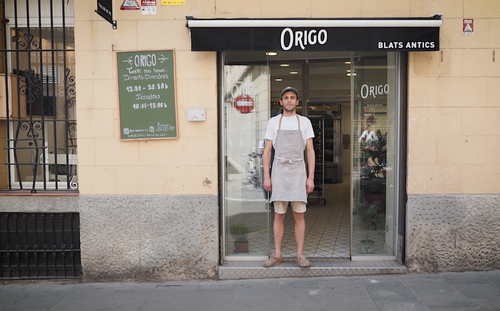Getting Down to Business in Barcelona
13. 11. 2019
3 min.


Freelance writer, journalist and author
If you’re thinking of moving to Barcelona for work, you’re not the only one. Located right by the Med, the city has everything—great beaches, culture, climate, and food, and it’s also the hot choice when it comes to the job market. Expats from around the world are choosing to make their home here, and are quickly finding positions among local and international companies. A 2018 survey carried out by the Boston Consulting Group of more than 360,000 employees across 197 countries ranked Barcelona as the fourth favorite city to move to for work in the world, after London, New York, and Berlin.
So, now that you’ve found the dream city, let’s see what career paths are available and what getting set up here involves…
Work, because it can’t be all play
Barcelona has been referred to as the Silicon Valley of Southern Europe for a reason: It’s the foremost tech hub in the region. By the end of 2018, it was where 34% of all Spanish start-ups were based, while investment in the city’s start-ups in the same year grew by more than 55%, year on year. Industries it’s long famed for being home to include pharmaceuticals and car manufacturing, while the spheres of healthcare, pharma, digital and tech, retail, and online retail are also buzzing.
Thanks to the growing number of offices of international companies and multinational headquarters appearing in the vibrant mix, there are plenty of jobs for English speakers. Plus, with its lively international community (nearly 20% of the city’s population are foreigners), the city is bursting with start-up companies and coworking spaces, making freelancing a very attractive and viable option. Native-English-speaking freelance writers, editors, translators, and designers are all in demand, and the city’s ESL/TEFL teaching opportunities are a sure bet for English speakers looking for a fast route to paid work.
The more popular jobs are in the digital and tech world, in areas such as sales and marketing, finance, fashion, and media.
The paperwork
If you decide to go solo and follow the freelance/entrepreneurial route, you’ll need to register as autónomo, or self-employed. This does involve a lot of tedious paperwork and paying a monthly contribution that, after two years, reaches as much as €275 (even if you’re not earning during that time), but it’s still an option many are going for in Barcelona. If it is the route you want to take, remember to pay your self-employment taxes, VAT, and social security contributions—and consider hiring the services of a gestor (an accountant), which costs about €60 a month, to help with all your declarations.
If you’re looking for a job in a company, you’ll become an employee with a contract—make sure it’s an official one entitling you to the Spanish social security system and its free medical care and pension system. You won’t need a visa to work in Barcelona if you’re an EU national, but other foreign nationals will be required to apply for a visa ahead of arrival. When it comes to contracts, there are two main types. The indefinite version is agreed without establishing limits on its duration and remains effective until the company or the worker decides to end it, with a two-week termination notice period required from both sides. A fixed-term contract is temporary and the maximum duration will be determined depending on the subject of the contract. These are for roles covering a specific project or service, leave, a production overload or backlog, work experience, and trainee contracts. They typically run for between six and twelve months.
Regarding unemployment benefit, foreigners with a residence and work permit have the same rights as any Spanish employee. You need to enroll with the Servicio Público de Empleo Estatal (SEPE), which is the equivalent of a local Unemployment Office/Jobcentre, within 15 days from the official end of your contract.
The key numbers to know
- 392,907: The number of people unemployed in Catalonia as at the end of 2018. The first quarter of 2019 showed the region’s jobless rate was among the lowest in the country, at 11.6%, compared to 14.7% across the whole of Spain.
- €1,050: The guaranteed monthly minimum wage in Spain for 2019.
- 29: The percentage of Spanish start-ups based in Barcelona, as at January 2019.
- 24: The number of tech multinationals opening bases in the city between 2016-2018.
- 16 weeks: Statutory maternity leave in Spain with full pay, with the right to take one year of unpaid leave after maternity leave, during which time the company is required to retain the new mother’s position.
- 8 weeks: Standard paternity leave in Spain, as at April 2019 (and due to rise in 2020).
- 2 weeks: The termination notice required by law.
- 40: Average number of hours worked per week.
- 0: Number of hours taken for siesta time during the week. The Spanish nap is an old tradition that’s hard to keep alive in a metropolis that doesn’t sleep and has solid working relationships with the rest of the world. If the opportunity for one ever does arise, it’s most likely to be at the weekend.
- 300: the estimated number of coworking spaces in Barcelona—the highest number in Europe currently. Spain as a whole is holding the fort in this respect and is ranked the No. 1 country for coworking in Europe.

Další inspirace: Work in Barcelona
Moving to Barcelona for work? Navigate the job jungle in this international hub with our insider tips, advice from locals and insights from industry experts.

Work in Barcelona: François
Originally from Belgium, he left his job at Google in San Francisco to move to Barcelona with his wife, where he decided to open his own bakery.
11. 12. 2019

Work in Barcelona
Considering relocating to Barcelona? Let’s have a look behind the scenes to understand what it takes to be a happy expat in Barcelona.
11. 12. 2019

Work in Barcelona: Amy
Born and raised in Canada, Amy moved to Barcelona to change career by retraining as a software developer. Here's her expat experience of the city.
11. 12. 2019

My Barcelona: ‘The city is so much richer than it seems’
For Anaïs, Barcelona is such an enticing city that she has made it her home not once, but twice.
13. 11. 2019

My Barcelona: ‘It’s the Silicon Valley of Europe’
Frenchman Erwan Riou originally qualified as an architect, but after a stint in Brazil, the 33-year-old started retraining as a programmer...
13. 11. 2019
Zpravodaj, který stojí za to
Chcete držet krok s nejnovějšími články? Dvakrát týdně můžete do své poštovní schránky dostávat zajímavé příběhy, nabídky na práce a další tipy.

Hledáte svou další pracovní příležitost?
Více než 200 000 kandidátů našlo práci s Welcome to the Jungle
Prozkoumat pracovní místa